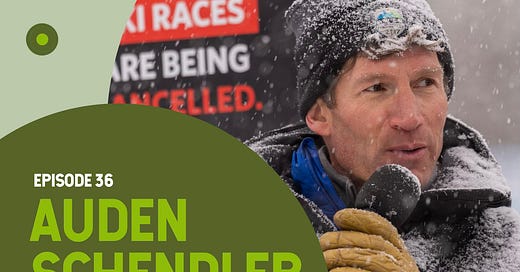Ep 36 / Reckoning with Climate Complicity with Auden Schendler
Author of the new book "Terrible Beauty" talks about his 30 years in corporate sustainability.
"How do you really green your company? It's almost f**king impossible."
That quote is from our guest for this episode - Auden Schendler - in a Bloomberg Businessweek article from 2007 titled “Little Green Lies”.
If you aren’t familiar with Auden, he learned about corporate sustainability at the Rocky Mountain Institute, which was co-founded by Amory Lovins, who was named one of the world’s most influential people by Time in 2009 and considered the Einstein of energy efficiency. Auden then moved on to Aspen Ski Company where he worked from 1999 to earlier this year as its Vice President and then Senior Vice President of Sustainability. Over the span of these 30 years, he’s been named a "climate innovator" by TIME magazine and a "climate saver" by the EPA.
In this episode, we talk about Auden's journey from growing up in New Jersey during the environmental decay of the 1970s and spending time with extended family in North Dakota - a place where he found the natural world as a refuge - to his work in local politics in Colorado and in the ski industry.
The focus of our conversation though is his new book, “Terrible Beauty: Reckoning with Climate Complicity and Rediscovering our Soul”. Published by Harvard Business Review Press, it is part memoir, part reflection, and part prescription from 30 years of working in corporate sustainability.
As Auden says, "climate changes threatens everything we care about," so we need to be willing to do the hard work as citizens to bring about real change. He also shares a few ideas about how corporate leaders can go beyond ‘corporate sustainability as usual’ that just upholds our fossil fuel economy to get to a place where they are using the power of their brand to push for systemic change.
When I initially read Auden’s book, I wrote the below passage on LinkedIn:
After reading some of Auden's stories, it's hard not think that 'green growth' might just be the MBA set's attempt to continue making bank through consulting while inequality grows and planetary gifts are exhausted. Auden calls it "magical thinking" that a free market system would convert more responsible practices into profit. It's just not how our capitalist economic incentives work. If the right choice was easy and profitable requiring no risk or sacrifice to revenue, most companies would already be doing it. The price of carbon-based energy is just too cheap for companies to change on their own. On top of that, Auden points out that the market isn't really free, with lots of incentives and subsidies supporting what are the wrong choices for those interested in maintaining a vibrant and healthy planet. (Spoiler alert - Auden thinks companies need to help change those incentives and subsidies.)
His conclusion is pretty direct -
“Corporate sustainability as currently practiced, researched, taught, and reported on, remains the best way to enable the success of the fossil fuel industry in accelerating climate catastrophe.”
As someone who has worked on sustainability related projects with one of the world’s largest consumer packaged goods companies and one of the world’s largest home decor makers, this conclusion felt like hearing the quiet part out loud. When pushed, very few people who work in corporate sustainability will say that companies are doing as much as they should. They face roadblocks and challenges at every turn, from short-term thinking to a lack of persistent public pressure that would help justify investment to create more environmentally responsible business practices and products.
However it isn’t all doom and gloom. “Terrible Beauty” is unlike any other sustainability book or article I've ever read. Auden makes an overall joyful case about how we be engage our role as citizens to build community and ultimately spur change that allows us all to thrive - as a parent, as a corporate leader or by just contributing to the place we live.
You can buy the book at audenschendler.com, and read a few endorsements from people far more noteworthy than me including Conrad Anker, Bill McKibben and former White House National Climate Advisor Gina McCarthy.
Watch/Listen to the Episode:





